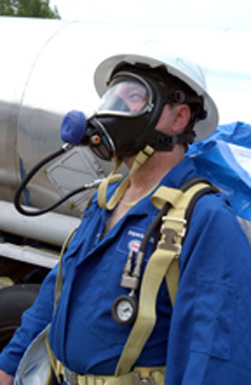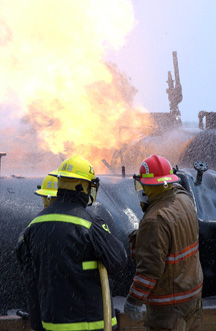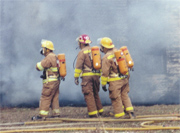 |
| |
Key Points for Evacuation:
- Assemble only the essential items you will need.
- Take your prepared emergency kit. Don't forget any necessary
medications or prescription drugs.
- If you have time, leave a short note telling others when you
left and where you went (this could be left in your mailbox).
- If you are evacuated, register with the reception centre so that
you can be contacted and reunited with your family and loved ones.
If you are going somewhere else other than the reception centre,
advise the centre of your whereabouts.
- Take items appropriate for the care, feeding and entertainment
of infants and young children.
- Pets should be caged or on a short leash.
CLICK HERE to view and download the Home Emergency
Preparedness Guide
|
|
Be Prepared for an Emergency
|
 During
some emergencies, it may be necessary to protect our citizens by evacuating the
area impacted by the emergency. An emergency evacuation centre may be set up to
provide shelter and food to people affected by the emergency. The nature,
magnitude and location of the emergency will determine the evacuation routes to
be used and what areas are affected. When you hear municipal emergency sirens or
the interruption of local cable TV, you should tune into the local
Sarnia-Lambton Radio stations for information and instructions: During
some emergencies, it may be necessary to protect our citizens by evacuating the
area impacted by the emergency. An emergency evacuation centre may be set up to
provide shelter and food to people affected by the emergency. The nature,
magnitude and location of the emergency will determine the evacuation routes to
be used and what areas are affected. When you hear municipal emergency sirens or
the interruption of local cable TV, you should tune into the local
Sarnia-Lambton Radio stations for information and instructions:
PLEASE NOTE: When you hear
sirens or local TV broadcasting interruptions other than Mondays at 12:30 noon
you are directed to monitor your local Sarnia-Lambton radio stations for
emergency instructions and for the most current information available. Stay
tuned to these radio stations.
Do not evacuate unless instructed to do so by radio or Emergency
Personnel. Exposure to chemicals could put you at risk, and unnecessary traffic
could hamper emergency operations.
Listen carefully to evacuation instructions as they are broadcasted or provided
to you by Emergency Personnel, and follow them exactly.
Click here to learn more about Sarnia's
Emergency Notification Sirens


|
Industries and Municipalities working together to ensure public safety
during an emergency.
|
|
 |

|
Trained professionals with state-of-the-art equipment can be called into action
quickly to respond to an event regardless of location.
|
|
 |

Providing the public with the information they need to prepare their household
for an emergency.
|
|
|
|
|
 |